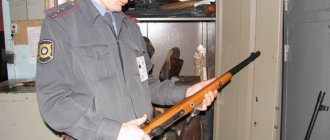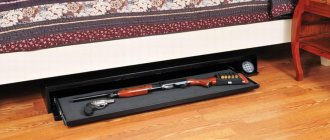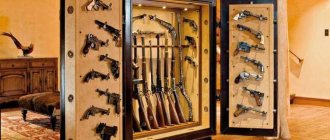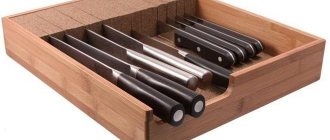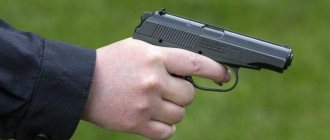Weapons are an item of increased danger, a product whose circulation in the country is strictly limited.
Improper use of weapons or violation of storage rules can lead to serious consequences. Not only do such actions result in criminal and administrative liability, but innocent people, including children, can suffer from weapons.
For whatever purpose a person owns a weapon: for hunting, personal self-defense or on duty, he is obliged to comply with the rules for storing hunting weapons and ammunition.
Features of obtaining a license
You can use weapons in the country only if you have a special permit to store and carry hunting weapons. Such documents are issued by the Center for Licensing and Permitting of the Main Directorate of the Ministry of Internal Affairs of the Russian Federation.
You can't just get a gun license. To do this, you will need to collect a package of certain documents and undergo training.
A license cannot be issued to a person who simply does not know how to use a weapon . That is why a training process is carried out, at the end of which those wishing to obtain a weapons license pass a special exam.
When the license for shotguns and pistols expires, it must be renewed again with certification and training.
However, there are several types of weapons that can be stored by citizens without obtaining a special license. These include:
- Products that are similar in appearance to the design of weapons;
- Air rifles, pistols and shotguns that have a muzzle energy of no more than 3 J;
- Signal pistols;
- Revolvers with a caliber up to 6 mm, cartridges for them.
The validity period of a weapons license is 5 years.
In order to be given the treasured weapon, you will have to document your sanity. A positive medical report is the main requirement for obtaining a license.
Normative base
The main legislative act regulating the acquisition, use and storage of hunting or other weapons is Federal Law No. 150 “On Weapons”. It specifies the types of weapons, restrictions on their circulation and the basic rules for their operation.
According to the law on the storage of weapons by individuals and organizations, hunting weapons are classified as civilian weapons, along with self-defense weapons, sporting weapons, signal weapons and bladed weapons.
In addition, this legal area is regulated by other regulations, in particular:
- Federal Law No. 99 – “On licensing of certain types of activities”;
- Decree of the Government of the Russian Federation No. 814 - “On measures to regulate the circulation of weapons and ammunition for them”;
- Order No. 13 of the Ministry of Internal Affairs of the Russian Federation “On the rules for storing weapons”;
- Order of the Ministry of Health of the Russian Federation No. 344 “On medical examination of citizens for issuing a weapons license”;
- The Criminal Code of the Russian Federation and the Code of Administrative Offenses of the Russian Federation - liability for violation of the rules for storing and using weapons.
Current laws prohibit the possession of weapons found or transferred by others.
If you find any weapon or receive it without transfer of ownership, it is your civic duty to hand it over to any police station.
Relevance of the issue
Many, even experienced owners, have many questions regarding the existing order. The fact is that according to the Law “On Weapons” (Federal Law No. 150), each region has the right to provide additional rules to federal acts. In this regard, the requirements in different regions of the Russian Federation may differ significantly. In addition, specialists from the licensing and permitting department can put forward their own requirements. There are no clear formulations in the legislation specifying regulations that directly concern individuals. However, there is a general procedure that must be followed.
Storing weapons at home: requirements
Weapons and ammunition must be stored at the place of residence of their owner. At the same time, he is obliged to provide such safe storage conditions that his weapons do not threaten or interfere with any unauthorized persons.
It is strictly forbidden to transfer weapons or ammunition to unauthorized persons, especially children.
Safes are used as shelves for storing weapons. They can be of the following type:
- Lockable metal cabinets;
- Special safes with a secure lock;
- Boxes made of high-strength materials;
- Wooden, but iron-lined boxes.
Storage of weapons at the place of actual residence, and not registration, is permitted if the conditions for its storage are ensured. No strangers or neighbors should have access to your gun safe.
You must notify your local police officer of your temporary move . As a rule, he either comes to check the storage conditions of weapons in a new home, or asks to send him photographs of the safe when the move is made to another city.
According to Order of the Ministry of Internal Affairs No. 288, citizens are required to store the following types of weapons separately:
- Cartridges must be stored in separate packages depending on their pyrotechnic compositions.
- Powder.
- Weapon.
- Precious weapons.
How to properly equip a storage room?
When a citizen owns a whole collection of weapons, he is obliged to ensure that its safety is protected by an alarm system.
There are cases when, for technical reasons, installation of a security and fire alarm system is impossible in the designated premises.
In such a situation, the law requires storing weapons in a special cabinet, which must be attached to the wall. It is required to use at least 2 bolts with a thread of 16 mm or more.
The door of a room that is a weapon storage room must have a separate lock. It is advisable to install bars on the windows if it is not possible to install an alarm.
Fastening gun cabinets to walls ensures their high safety . It is almost impossible to take such boxes of weapons out of the house due to their weight and secure fastening.
Safe for hunting rifle
The main requirement for a quality safe is a reliable lock. The use of safes without locks is considered unacceptable.
There are several types of locks:
- Key – the use of one or more keyholes, the keys of which should not be in the public domain.
- Mechanical - open after entering a code combination of numbers.
- Electronic – locked using special magnetic keys or fingerprints.
- Combined - use a combination of several types of locks.
The thickness of the safe walls should not be less than 2 mm.
The reliability of a gun safe includes two parameters: fire resistance and burglary resistance. The minimum risk of breaking into the safe is ensured by the most secure lock.
To reduce the likelihood of damage to weapons due to fire, you need to select safes made of special fire-resistant materials. Such safes can retain their contents for a long time, even in the event of a serious fire.
Inside the safe there should be special compartments for ammunition and reliable fastenings for securing weapons.
Requirements for a safe for storing hunting weapons
First of all, the size of the safes should not interfere with the opening of doors and windows, nor interfere with the free movement of other family members. Safes cannot be installed in children's rooms.
There are the following requirements for installing gun safes:
- Boxes with cartridges should be located no closer than 1 meter to heating devices (heaters, tiles, pipes);
- The safe should be located at a distance of 1.5 meters from the front door;
- The safe should be located at a distance of 0.5 meters from the nearest window.
The best thing to do is to disguise a gun safe . It should be in full view of everyone who visits your apartment. It's great to hide it inside a closet or in the bathroom.
You should be attentive to the actions of police officers who check compliance with weapons storage rules . Often, district police officers come to check without warning at a time when the owner of the weapon is not at home.
Under the pretext of checking the license plates of weapons, employees ask one of the family members at home to open the safe.
According to the rules for storing weapons, none of them should have access to the safe and they also cannot know where the keys to it are.
Gaps in legislation
The above rules for storing weapons do not contain separate clauses relating to specific categories of owners. In particular, requirements are not established for legal entities that are detective agencies, sports, trade and other organizations. There are no specific regulations for athletes, hunters, collectors, hobbyists, and so on. In accordance with the Instructions, the procedure provided for legal entities is also applicable to citizens. At the same time, there are ambiguities in the requirements. For example, the rules for storing weapons provide for the installation of bars on windows. At this point it is not clear whether they apply exclusively to collectors or to other citizens too. Meanwhile, in rural areas, many individuals live in one-story houses. Accordingly, the requirement for bars is somewhat absurd. Another incomprehensible point concerns the conditions for attaching the box to the wall, the presence of an additional compartment for storing gunpowder and cartridges. It is not entirely clear whether this regulation applies to all owners or to certain categories. Experts recommend ensuring maximum safety. This means that it is advisable to study all the rules for storing weapons - general and special, developed in the OLRR - and create conditions that best comply with them.
Storage of weapons and ammunition by legal entities
Unlike citizens, who have no premises other than their own apartment, companies are required to store weapons in separate premises.
Weapons must also be kept in safes and special cabinets. The weapon must be unloaded with the trigger engaged. The cartridges are located separately from the weapon.
Legal entities are required to store weapons with tags on them indicating the series, model and name of the weapon.
It is imperative that those weapons that are accepted for safekeeping by citizens must be stored separately from weapons stored on the balance sheet of the company itself.
Loose cartridges must be kept exclusively in metal boxes under two secure locks.
Separate placement
Separate metal cabinets, safes, boxes, pyramids contain:
- Cartridges and weapons, except those specified in paragraph 164 of the Instructions. In this case, items containing pyrotechnic compositions charged with tear gas or other irritating substances must be placed in separate packaging. A similar regulation applies to cartridges that misfire.
- Artistically designed models containing precious stones or metals.
- Weapons seized and accepted for temporary storage from employees of organizations and individuals, as well as those on the balance sheet.
- Gunpowder packaged in special metal sealed closures, as well as in plastic bags for retail sale.
The rules for storing rifled weapons require the installation of cabinets and drawers with locks, the walls of which must be at least 2 mm thick; in safes containing gunpowder, products including pyrotechnic charges or projectile equipment - 3 mm; in containers used for air transportation - not less than 1.6 mm.
Carrying and transporting weapons
The carrying and transportation of hunting or other weapons and ammunition are subject to even more stringent requirements than their storage.
The main restrictions are presented below:
- Carrying hunting weapons is allowed only in special hunting grounds;
- Carrying a weapon for self-defense is allowed only in a holster with the safety catch on;
- Carrying weapons at public events is prohibited;
- It is prohibited for a person under the influence to carry a firearm;
- It is prohibited to fire weapons in areas not designated for this purpose;
- When carrying a weapon, you must have a passport and a license with you.
In order to transport weapons, you must obtain a special permit valid for no more than 1 month.
The following types of weapons can be transported without a permit:
- Not subject to registration;
- Firearms for self-defense without the right to carry;
- Hunting and sporting weapons when transported to a hunting or competition site;
- Which moves within the subject of the Russian Federation where it is registered.
Negligence
As you know, there are different types of weapons. Most of them require obtaining permits. The rules for storing traumatic weapons require, as in other cases, to ensure safety conditions. Negligence in this case is equivalent to a criminal offense. The criminalization of non-compliance with the established procedure is determined by its high danger. The object of the crime is the health and life, and in some cases, the property of a person. By failing to comply with the rules for storing smooth-bore weapons or any other type, the subject creates conditions for their use by unauthorized persons. This can lead to serious consequences.
Responsibility for violating the procedure for using weapons
Any violations of storing or carrying hunting or other types of weapons are strictly punished. Depending on the offense, both administrative and criminal liability may be applied.
Administrative responsibility
The Code of Administrative Offenses of the Russian Federation has several articles regulating the rules for handling weapons . Let's look at the most commonly used of them:
- Art. 20.8 – violation of the rules for storing, carrying and destroying weapons. For example, the lack of safes or alarms, carrying a pistol in your pocket, the presence of weapons at a rally, etc. Such behavior threatens with a fine of up to 2,000 rubles or deprivation of the right to store weapons for a year.
- Art. 20.9 – installation of a night vision or silent shooting sight on the weapon. Such tuning is fraught with fines of up to 2,500 rubles with confiscation of installed devices.
- Art. 20.11 – violation of deadlines for registering weapons. The fine for violation will be a maximum of 3,000 rubles. Sometimes you can get by with a warning.
- Art. 20.12 – violation of the rules for transporting weapons provides for a fine of up to 3,000 rubles and deprivation of the right to own weapons for up to 2 years.
- Art. 20.13 – shooting in undesignated areas. This is the same hunt in the wrong place. Responsibility will be applied in the form of a fine of up to 5,000 rubles with confiscation of weapons.
For carrying a weapon by a drunk person in 2022, a fine of up to 5,000 rubles will be imposed with confiscation of weapons and ammunition.
Criminal liability
In the Criminal Code of the Russian Federation, responsibility for the illegal acquisition and storage of weapons is enshrined in Art. 222 . According to the article, such actions are a crime and involve the following types of punishment:
- Restriction of freedom up to 3 years;
- Forced labor for up to 4 months;
- Arrest for six months;
- Imprisonment for up to 4 years.
Six years in prison can be received for committing a crime by prior conspiracy by a group of persons, and 8 years for an organized crime group.
If a criminal voluntarily surrenders illegally acquired weapons, he may be released from criminal liability.
Hunting weapons are a type of civilian weapon and have similar acquisition and storage rules as weapons for self-defense.
Current legislation strictly regulates the rules for storing any weapons that pose a danger to society.
When obtaining a weapons license, you need to understand the full responsibility of such ownership, the possible risks and be prepared to bear responsibility for violating established legal norms.
Expert recommendations
Experts advise choosing cabinet locks with special attention. Locking mechanisms must be resistant to burglary and many years of frequent opening. Don't save money and buy boxes with postal locks. The resource of such mechanisms is very limited, and the reliability is minimal. Experts also recommend avoiding purchasing cabinets that have door locks. As practice shows, Chinese mechanisms last no more than a year, Italian and Israeli - 4-5 years. According to the results of the research, it was found that the owner of the weapon uses the cabinet for an average of 25 years, and opens it about 20 times a year. Thus, the need to install a quality lock is obvious. Most cabinets and gun safes are heavy and tall. To prevent such a structure from falling, it is advisable to attach it to the floor or walls with bolts. This is also true for a private home. Country property owners should pay attention to the built-in designs of safes and cabinets. Such structures are highly resistant to burglary. In addition, they can be disguised quite easily. Don't forget about fire safety. Cartridges should be stored separately in a safe located away from heating appliances. You can purchase a fireproof cabinet in specialized stores.
